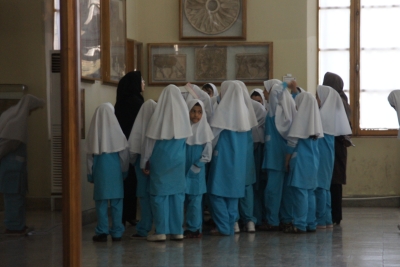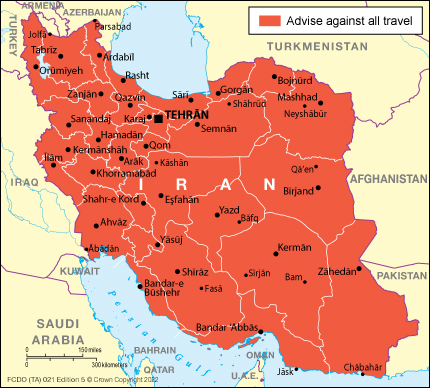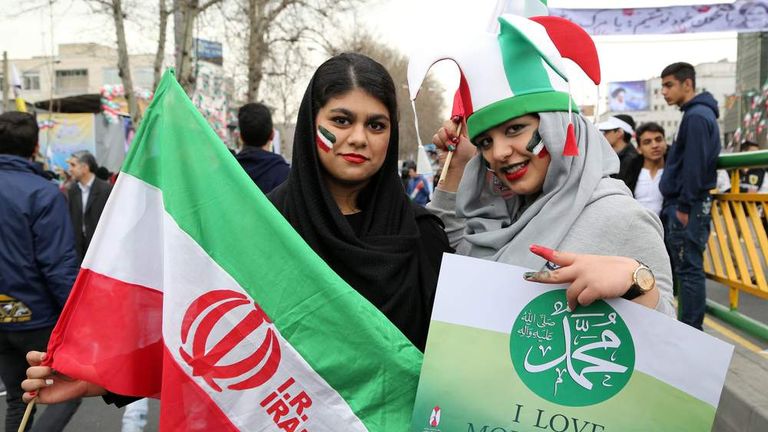The next country I went to after Turkmenistan is Iran. There are plenty of misconceptions about Iran in all countries (not just developed Western ones). Given that the situation has deteriorated a lot since my visit in Oct 2011, there will probably be even more misconceptions — and lies — around. So I thought it was important to preface any actual travel content with a quick rundown of misconceptions.
A quick note: I will take the same attitudes to these as Greg Laden’s 2009 ‘falsehoods’ series. For the purpose of the series, Laden spoke of a falsehood as not merely an incorrect statement but “a statement that sounds right to people…[b]ut, the meaning that statement comes with is flawed…So, the statement ‘humans evolved from apes’ is a falsehood not because it is incorrect (in fact, it is correct), but because the implications and meaning the statement comes with for most people are wrong.” Similarly, some of the misconceptions in the headings I may believe to be literally true but in a very different way to the baggage that most people will bring with the statement (hence a misconception)

Iran is dangerous to go to: This is the strongest of the misconceptions and quite a large percentage of people expressed concerns for my safety when they found out I was going (or had gone). In my experience, the biggest hassle by far was getting in. As in the Central Asian countries, you apply via a 2 step process. Digging around on internet travel forums, you’ll find that Iranian embassies around the world have very different responses with some a lot more known for arbitrary rejections than others. Once you’re inside, however, I have found Iran to be possibly the safest country to be in out of all the ones I’ve travelled. Now, I’m aware that often travellers simply don’t know enough to realise that they are in a dangerous situation, especially when they’re unfamiliar with the culture. However, based on the interactions of our group, I would put the chance of being attacked (say) on the street during a as extremely low. Obviously this excludes times of protests, riots, government crackdowns and the rest — just like in any other country. We simply did not encounter a single problem and I certainly felt safer being out at night or going into a dark alley than I would in Sydney. According to this Wikipedia page, the murder rate is certainly higher in Australia, but I believe I’ve seen elsewhere that assault rates in Australia are quite high for a western country. Also given that Libya and South Korea are right next to each other, I don’t think something like murder rate is a great overall indication of how safe a country is. Another point is that you would expect to be safe in a police state, so the stereotype that Iran is dangerous somewhat contradicts the stereotype of Iran being a police state (which isn’t really a misconception).

Iranians are hostile to Westerners: We have encountered nothing but friendliness. Again, I’m aware of the biased sampling — we were mostly in cities where people tend to be more cosmopolitan, we did not go to extremely religious places (eg. the city of Qum that’s the seat of most of the mullahs) and so on. However, we did go to a shrine that was one of the most sacred in Shia Islam and none of the mullahs or any of the other people there batted an eyelid. On the contrary, people would often say hello on the streets, ask to have a picture taken, practice their English and ask what you think about Iran (and whether you find it beautiful). True, I don’t know what’s inside people’s heads. And yet, there are plenty of places that actually are hostile to visitors (whether Western or otherwise) and people generally find out because it shows, not because they read the minds of locals. So if someone needs to rely on some unproven hatreds that people don’t express as the “gotcha”, they’ve already made up their minds. The bottom line is that the vast majority of people are genuinely friendly.
Iran is a backward, undeveloped country: I was asked by an Israeli relative if they have things like [modern?] roads, at which my jaw dropped. There are certainly areas with low development, rural areas where poverty is extremely high. However, people tend to have a skewed sense of what’s “backward” if they’re getting their info just from the news. Consider for instance an old post where I ask the reader to identify the country. As I’ve mentioned, the IMF ranks Iran 17/183 by GDP. This does not make it backward in most senses. 85% of the population is literate (Middle East average is 62%), among young people this is 97%. An impressive 60% of university graduates are women, which makes Iran way above any country in the region. The rate is higher for science and engineering, which is very different to the west. Not that things are peachy, and I’m not trying to make it seem like things in Iran are great. There is hyperinflation, unemployment and a lot of people struggling to feed themselves (much of this a result of the ongoing embargo). But the above should at least put to rest the idea of “backwardness”: Iran is doing a good job in having the most modern infrastructure and technology that is available for its circumstances.
[EDIT: Wow. In a fairly unprecedented move for Iran, since I wrote this post, the clergy have banned women from around 70 university degrees. This catastrophically reduces opportunities for women’s education and has sparked plenty of anger both inside and outside Iran. The reason cited by the clerics is noteworthy: the high level of education of Iranian women is affecting demographics with women choosing to marry later, have fewer babies and even daring to presume to decide how to live their lives.]
Iranians are religious fanatics: Iran is not a pure theocracy, it is a mixture of a parliamentary system and a theocracy. Which makes for some political conflict but yes, certainly the fundamentalist clerics have tremendous power over policy. (As a side note, what counts as fundamentalism in Iran and within Shia Islam is quite different to the stereotypes of Islamic fundamentalism that people often have.) However, if you have tremendous power wielded by the extremely religious, the average citizen will be considerably LESS religious than the ruling class. This is simply a necessity if you have the most religious people ruling. So yes, there are plenty of people in Iran for every level of religiosity. But this averages out to something that’s very different to official policy. The cities do not stop for prayertimes and from my observation not many Iranians do all the daily prayers. Alcohol is forbidden but people in our group were offered homemade stuff in every city (I was not offered because I don’t look cool enough apparently). I used to have an Iranian roommate who said that there is more alcohol and drugs in Tehran than in Sydney. Again, this is not to minimise all the horrible things but to explain that things do not seem to function like outsiders tend to think.
Ah, but what if they found out you were Jewish?: I was asked this by border security in Israel and a few other places. I believe each time there as an “aha, checkmate!” mentality to it. This is what I generally find offensive about the question. If people were really interested in what it’s like to be a Jew in Iran, they would be advised to actually learn about what it’s like for the 25,000+ Jews to live in Iran. There are a few stories like this NY Times opinion piece (flawed as it may be — the author was grateful there were no pogroms in response to the airstrikes on Gaza…) The high level of anti-semitism is certainly undeniable. But again, if you’re worried about tourists but don’t take the time to think about the complexity of Jews who are actually full-time participants in Iranian society, it then becomes a rhetorical trick.
Finally, there’s the biggest misconception of them all — Iranians are significantly different to you or me.





0 Comments